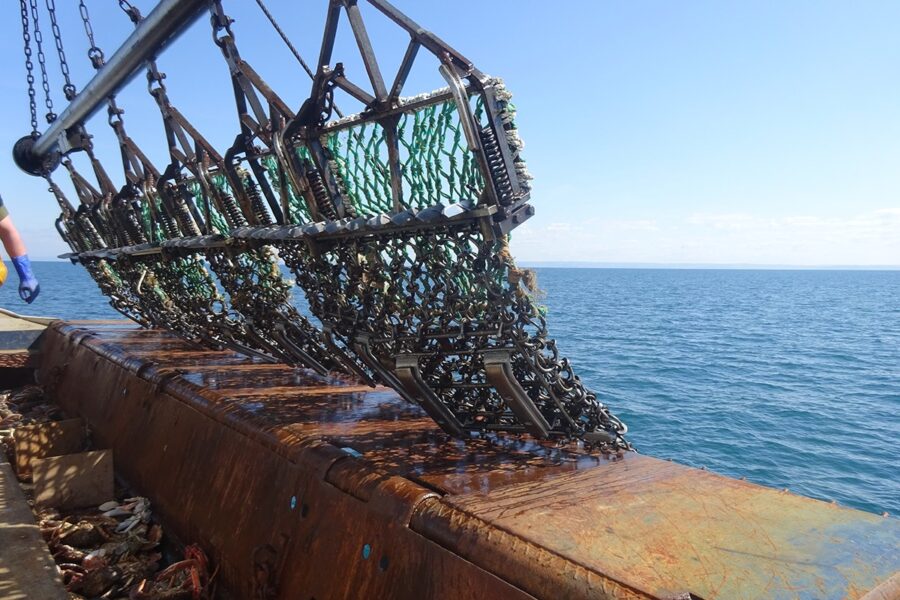The automated scallopers Harmoni, skippered by Mark Roberts, and Evening Star, skippered by Gary Buchan, have completed trials of dredge modifications in partnership with Heriot-Watt University and Bangor University.
Part of an 18-month project scheduled for completion in March 2022, the trials are part of the LISIG (Low Impact Scallop Innovation Gear) project funded under the UK Seafood Innovation Fund, a DEFRA scheme administered by CEFAS.
The trials aim to investigate the practicality of dredge modifications that are intended to reduce seabed impact and fuel consumption and increase profitability.

Harmoni and Evening Star crew members helped to sort and measure the catches from a total of 85 hauls in Welsh and Scottish waters, to compare the catch and bycatch (animals and stones) of the conventional and modified dredges. (Photos: Mark Roberts, Marija Sciberras)
Chief scientist supporting the project Dr Marija Sciberras of Heriot-Watt University explained: “The main aim of the project is to evaluate the impacts of placing skids on the belly bags of the dredges that raise them 10-11cm off the seabed. In doing this, we hope there will be some clear benefits in reduced drag, and therefore fuel consumption, and reduced wear on the belly bags, as well as lower levels of damage on seabed fauna.
“We’re having excellent support from the two skippers involved, Mark from the Harmoni and Gary on the Evening Star, ensuring dredge design is both practical and durable.
“We have aimed to strike a balance between the need for detailed data collection and to maintain commercial viability, so the trials to date have involved two-mile tows, which entails a lot of counting and measuring. We’re very grateful for the support we’ve received from the crew of both vessels with this work.”

Scuba diving trials were carried out in conjunction with the gear trials earlier this summer in the inner Moray Firth. Divers from Heriot-Watt university recorded fauna damage and mortality on the seabed following tows by the conventional and modified dredges. (Photo: Bill Sanderson)
Initial results of fuel consumption monitored by the Harmoni during business- as-usual commercial practice suggested that consumption is unchanged – the bellies fitted with skids are heavier, but this seems to be offset by lower drag. A future aim is to look at lighter-weight materials that may provide fuel savings above and beyond this.
Mark Roberts said: “The initial trials were extremely positive. We will continue to use the gear over the coming months to further monitor fuel usage, wear on the gear and seabed impact.
“At a time when the public are quite rightly becoming increasingly environmentally conscious, in order to survive into the future, the scallop industry must make every effort to reduce its environmental footprint by transitioning to a more minimum-impact, maximum-return fishery through smarter working practices and harvesting strategies, and ensuring the best prices at the marketplace.
“Key to this, of course, will be for both the catching and processing sectors to collaborate more closely with the scientific community and fishing administrations.
“Thanks to all involved in this project from Heriot-Watt university, Bangor University and the Institute for Mediterranean Studies (IMEDEA) for all their efforts to help the industry through this project.”
The scientific team has recently completed its work in Scottish waters aboard the Evening Star, with divers assessing the dredged areas to record whether the seabed impact of the new dredges is also reduced. A full assessment of the trials, including cost/ benefit analysis of fishing with these dredges, will be available in March 2022.
The UK Seafood Innovation Fund is administered by CEFAS on behalf of DEFRA.
The programme encourages sustainable and innovative ideas to bring about seafood security, create new partnerships across seafood and technology sectors, and contribute to strong evidence-based management.
Find out more here and on Twitter.
This story was taken from the latest issue of Fishing News. For more up-to-date and in-depth reports on the UK and Irish commercial fishing sector, subscribe to Fishing News here or buy the latest single issue for just £3.30 here. Main photo image: Marija Sciberras.








